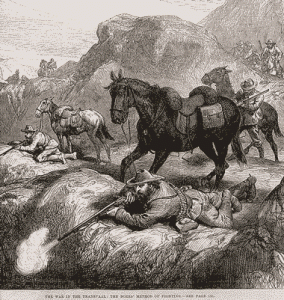World News
110th anniversary commemoration of Boer War skirted ‘sensitive’ details
Wikipedia photo
OTTAWA – The Conservative government was warned in advance by bureaucrats that its 110th anniversary commemoration of the Boer War celebrated a “sensitive” conflict.
In fact, a speech by the then-veterans affairs minister at the May 2012 event purposely “speaks of the war only peripherally” in order to avoid uncomfortable context, according to documents obtained by The Canadian Press under the Access to Information Act.
That context includes deep English-French divisions over a British imperialist conflict on the other side of the globe that marked the modern innovation of brutal concentration camps for civilian populations.
The Harper government has made the celebration of Canada’s military past a key part of its political brand, even as it has taken a public pounding lately over its cost-cutting treatment of surviving military veterans of more modern conflicts.
Government-funded events begin this year to mark the 100th anniversary of the beginning of the First World War, and will continue for the next six years to include various battles encompassing the 75th anniversary of the Second World War. No budget for these events has been released.
Ottawa spent $30 million celebrating the 200th anniversary of the War of 1812.
So when a Commons committee recommended in December 2011 doing something to mark the participation of more than 7,000 Canadian volunteers in Britain’s 1899 war in South Africa, the government seemed happy to oblige.
Bureaucrats in Veterans Affairs spent a month and half preparing for the May 31, 2012, event to mark the signing of the treaty that ended the bloody conflict.
It featured then-minister Steven Blaney, serving military, descendents of Boer War volunteers and local high school students.
Hundreds of pages of documents obtained by The Canadian Press show planning details down to the seating arrangement, art work, a scripted MP statement for the House of Commons (known as an SO-31), and even posts on Twitter, laboured over in advance.
“I never want to see this again, this is the 10th time I have commented on this,” an assistant deputy minister acidly responded to a list of invited officials.
The same senior bureaucrat was asked to sign off on Blaney’s prepared speech for the event and responded with a fundamental observation: “Speech doesn’t tell what the war was about, we are missing a learning opportunity.
”
That set off a long flurry of emails.
In response, civil servants noted, “This is a somewhat sensitive war.”
“It was fought primarily over British imperialism. Canada was divided on the war. Quebec in particular wanted no part of it,” came the answer from Veterans Affairs’ “approvals” co-ordinator.
The note goes on to say the conflict was even “more sensitive” in that it marked the first use of concentration camps by the British.
“The families of Boer fighters were put in camps to stop them giving food and help to the fighters. Houses and farms were burned. At least 30,000 people, mostly children, died in these camps from sickness and hunger.”
Bureaucrats also noted that the war was fought only after diamonds were discovered in the region where the Boers had settled, prompting Britain’s interest in the area.
“For these reasons, the speech speaks about the war only peripherally.”
Strategic communications from Veterans Affairs got involved, seeking a “diplomatic reference to the war” in the speech.
“Good luck :-)” responded another civil servant.
In the end, a couple of paragraphs were added to Blaney’s speech noting that “tensions in southern Africa escalated as the years went by, particularly after the discovery of rich diamond and gold deposits in the second half of the 19th century,” which “led to increased British interest in the area” and eventually to war.
The office of current Veterans Affairs Minister Julian Fantino responded to questions from The Canadian Press with an unsigned email stating only that Blaney, as minister, “attended hundreds of events across Canada and internationally to commemorate the sacrifice of Canadians during all conflicts where our brave men and women in uniform were involved.”
An anonymous departmental spokesperson at Veterans Affairs Canada defended the 110th anniversary event by stating in an email: “In many ways the origins of our country’s tradition of international military service and sacrifice can be directly traced back to this conflict.”
“The department exists to pay the debt of a grateful nation to those who have protected Canadian values in times of war, military conflict and peace.”
Veterans Affairs also provided a link to the Commons committee report that recommended the Boer War commemoration. That same report recommended improvements to the Last Post Fund for defraying the funeral costs of military veterans, something the government only began to address more than a year later.






















